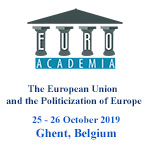Euroacademia Conferences
 Europe Inside-Out: Europe and Europeanness Exposed to Plural Observers (9th Edition) April 24 - 25, 2020
Europe Inside-Out: Europe and Europeanness Exposed to Plural Observers (9th Edition) April 24 - 25, 2020 Identities and Identifications: Politicized Uses of Collective Identities (9th Edition) June 12 - 13, 2020
Identities and Identifications: Politicized Uses of Collective Identities (9th Edition) June 12 - 13, 2020 8th Forum of Critical Studies: Asking Big Questions Again January 24 - 25, 2020
8th Forum of Critical Studies: Asking Big Questions Again January 24 - 25, 2020 Re-Inventing Eastern Europe (7th Edition) December 13 - 14, 2019
Re-Inventing Eastern Europe (7th Edition) December 13 - 14, 2019 The European Union and the Politicization of Europe (8th Edition) October 25 - 26, 2019
The European Union and the Politicization of Europe (8th Edition) October 25 - 26, 2019 Identities and Identifications: Politicized Uses of Collective Identities (8th Edition) June 28 - 29, 2019
Identities and Identifications: Politicized Uses of Collective Identities (8th Edition) June 28 - 29, 2019 The European Union and the Politicization of Europe (7th Edition) January 25 - 26, 2019
The European Union and the Politicization of Europe (7th Edition) January 25 - 26, 2019 7th Forum of Critical Studies: Asking Big Questions Again November 23 - 24, 2018
7th Forum of Critical Studies: Asking Big Questions Again November 23 - 24, 2018 Europe Inside-Out: Europe and Europeanness Exposed to Plural Observers (8th Edition) September 28 - 30, 2018
Europe Inside-Out: Europe and Europeanness Exposed to Plural Observers (8th Edition) September 28 - 30, 2018 Identities and Identifications: Politicized Uses of Collective Identities (7th Edition) June 14 - 15, 2018
Identities and Identifications: Politicized Uses of Collective Identities (7th Edition) June 14 - 15, 2018
A Philosophy for Europe: German Philosophy, French Theory, Italian Thought
-
-

-
Presentation speakers
- Corrado Claverini, University of Salerno, Italy
Abstract:
What are the characteristic features that distinguish “German Philosophy” from the “French Theory” and “Italian Thought”? The central research hypothesis of this paper is that, since its origins in Renaissance humanism, each tradition has particular characteristics. For example, in Italy, there has never been great attention paid to the philosophy of science and logic which is ever-present in the Anglo-Saxon context, nor a philosophy of the interior as seen in France from Pascal to Maine de Biran; nor again a highly metaphysical tradition as in Germany, from Leibniz, to Kant up to Idealism. The nature of the Italian tradition of thought is to be a “philosophy of praxis” (political and civic vocation, great attention to history, etc.). The structurally plural soul of European philosophy will be shown: the big difference between “German Philosophy”, “French Theory” and “Italian Thought” is only one of the several examples of the richness of European culture. Far from being an obstacle, Europe’s diversity of languages, cultures and traditions is a great treasure to be preserved. The process of construction of European identity should not be based on the cultural homogenization, but on the enhancement of the diversity of cultural expressions. It will therefore be useful to show the possible dialectic of political unity and cultural diversity.
-
Related Presentations

European Social Thinking and the “Other”
- Dolores García

Visibility Hierarchies: Santiago Sierra and the Homo Sacer
- Pedro David Massena Carreiro

One Belt One Road Initiative Nexus to the European Union and China Relations: A New Economic Debunching?
- Elif Uçkan Dağdemir

#Portichiusi: The Human Costs of Migrant Deterrence in the Mediterranean
- Michele Cantarella













